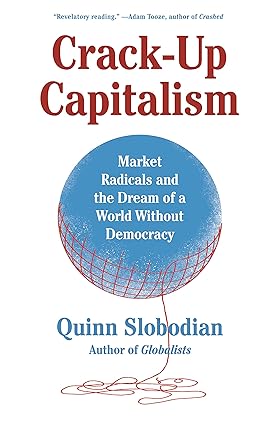
Another attempt to keep myself honest, and read something that won't simply reinforce my biases toward free-market capitalism and personal liberty. The author, Quinn Slobodian, is a professor at Wellesley. His book-flap thesis is alarming: "the most notorious radical libertarians—from Milton Friedman to Peter Thiel" plot to subvert and eliminate "democracy" by setting up "different legal spaces: free ports, tax havens, special economic zones." Examples are many: the author endorses the so-called Open Zone Map to demonstrate their ubiquity. There's almost certainly one near you.
There is one near me, although the map's description differs somewhat from the description provided by the New Hampshire Department of Business and Economic Affairs. All, or parts of, 9 NH counties are considered "Foreign Trade Zones"; as the page explains: "For the purpose of assessment and collection of import duties, foreign imported merchandise entered into a zone is considered not to have entered the commerce of the United States, so duties are not paid while the merchandise remains at the site." Granite State democracy does not seem to have been seriously threatened. As yet.
The author presents a number of case studies, from historical to present-day: Hong Kong, London, Singapore, South Africa, Lichtenstein, Somalia, Dubai, Silicon Valley, and "the cloud". These are interspersed with profiles of some of those "radical libertarians": not only Milton Friedman, but also son David, and grandson Patri. And a host of others in addition to Thiel: Murray Rothbard, Hans-Hermann Hoppe, James Dale Davidson, Hayek, Mises, etc.
Let's get some stipulations out of the way:
(1) The interactions between governments and businesses are well-known to be rife with rent-seeking, corporate welfare, and corruption. Slobodian does a fine job pointing this out.
(2) Libertarians generally do not hold "democracy" up as an ultimate good. For example, Cato's Human Freedom Index notes a strong international correlation between freedom and democracy. But it cautions "Unrestrained democracy can be inconsistent with freedom." And it sends you off to Isaiah Berlin's "Two Concepts of Liberty" for explication, if necessary.
(3) There's an awful lot of libertarian thought devoted to imagining utopian liberty-maximizing social structures. This is blue-sky stuff, and it's full of possible models and guesswork. And (see above) "democracy" might show up in them, and it might not.
(4) There's also an awful lot of libertarian criticism of current systems, nation-states running their fiat currencies. Some of that can get overwrought and apocalyptic, because that sells books. (I have a number of those on my bookshelves from previous decades predicting many imminent economic/social disasters that never happened.)
(5) There are a number of grifters and crackpots in the libertarian movement.
Slobodian tries to gather all these messy features into a coherent whole. It's far from a perfect fit, and at times his thesis resembles one of those dot-connecting conspiracies, corkboards with ragtag newspaper clippings, pushpins, and connections in red yarn. He imputes way too much importance and influence to libertarians, especially the ones outside (say) the Reason magazine-mainstream.
Slobodian never really engages with libertarian worries about "democracy" and its possible threats to liberty and prosperity; he just treats those worries as self-evidently misguided.
("And, yes, David Friedman is a longtime member of the Society for Creative Anachronism. Your point being?")
Occasionally, Slobodian lets some level-headedness creep into his discussion: he grants that nation-states are a relatively recent development, and they could well be replaced by "something else". He treats that as obviously bad; I think it might be inevitable. As that process unfolds, you really want people thinking about the best ways to preserve human freedom and well-being along the way.
![[The Blogger]](/ps/images/barred.jpg)



